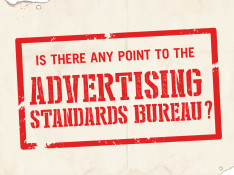Is there any point to the Advertising Standards Bureau?
 While the industry body receives hundreds of complaints about ads, many are outrageous and few are actioned. In a feature that first appeared in Encore, Miranda Ward finds out whether there’s any point to the ASB.
While the industry body receives hundreds of complaints about ads, many are outrageous and few are actioned. In a feature that first appeared in Encore, Miranda Ward finds out whether there’s any point to the ASB.
In the last year a grand total of 3,640 complaints were made to the Advertising Standards Bureau (ASB) relating to more than 500 ads. The ASB’s board looked at 473 of these ads and only 68 were found to have breached its Code of Ethics.
With less than 100 ads breaching the Code in a year, the question of the ASB’s relevancy begs to be asked. Has the ASB become more of a burden to the industry than a requirement?
Part of the industry’s self-regulation system, the ASB deals with complaints on a daily basis. Some of them address violence, nudity and explicit language in advertising but many of the complaints border on the ridiculous. In the last month alone, an ad for preservative-free Devondale Long Life Milk featuring a girl glowing in the dark drew complaints and was subsequently banned by the watchdog because, according to the ASB, the phrase ‘preservatives have consequences’ “would be considered misleading by reasonable members of the community”.


It is essential, almost useless, but essential.
In a world where social mores are changing, switching and morphing all the time, it is almost impossible to keep track of what is morally right or socially acceptable for the majority.
It has become far more important to be seen to be doing the right and proper thing than it has to follow a well defined line of social good manners and morality.
So we have watch dogs, empowered groups making knee jerk decisions and jumping into action to stem something that 20 years ago was considered lame, and next week will feature on a TV comedy show, whilst all manner of vulgarity is hurled about like chunder.
When they banned a Toyota advert with BABIES driving a Landcruiser as being dangerous, they lost any respect from me.
I once complained about the inappropriate sexual ads that used to be on late night TV and was told the ads were ok as they complied with their rulings.